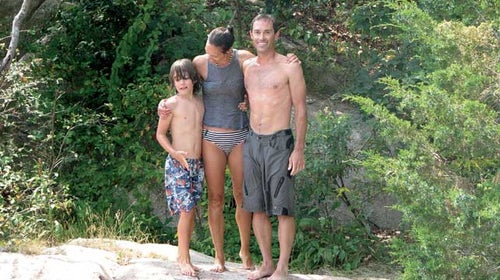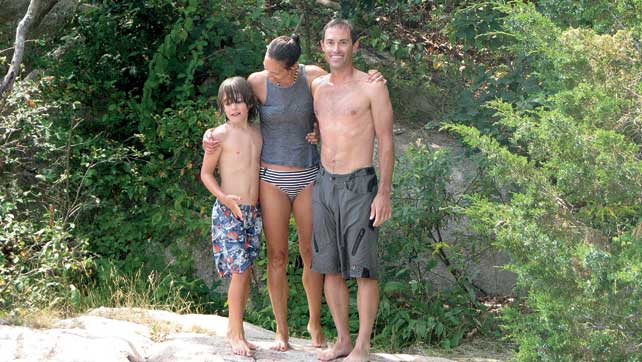AS YOU ALREADY ASSUMED from the vowel at the end of my name, ours is a crime family. My son, Jake, is a hardened scofflaw. He’s 10. Just last summer I convinced him to flout his first ordinance. We’d flown from our home in Boulder, Colorado, to spend a week visiting my childhood home of Scituate, on the South Shore in Massachusetts. A favorite memory from my teenage years involves jumping from the Cohasset Bridge a few towns to the north. I wanted to share the experience with the little hoodlum. We made Granny drive the getaway car. My wife, Sarah, rode shotgun. In the '70s and '80s, the local police would for jumping the 25 feet into the tidal river. When they couldn’t catch you, they’d confiscate your Chuck Taylors and make your mom bring you in for a stern talking-to. Or so the story went. The fact that it was illegal only made it that much funner. The cops hitting their sirens. The kids scattering.
Jake and I padded nonchalantly to the bridge. It was much as I remembered it. The faded NO JUMPING signs were still stenciled into the asphalt. The concrete railing had been replaced with metal, but otherwise the only difference was the water, which looked cleaner. Some things have gotten better in the world.
It’s best to jump when the tide is coming in and almost full. That way the water is the deepest and the current pushes you away from the rapids by the harbor. Not that the rapids are very threatening. As kids we bodysurfed the wave train in both directions until the tide dropped and barnacles punched us full of holes. At high tide, I suppose, the only real danger would be drowning. And that would require not knowing how to swim.
The bridge was deserted as we approached the rail. It was a hot July afternoon. I wondered if law enforcement had increased or if the younger generation was at home playing Wii and only simulating coming of age. I could feel the tension buzzing from my son. His eyes shined with a new alacrity and focus. As we prepared to climb over to the ledge, two teenage boys walked up. They cautioned us that the current was strong and looked at Jake as if marking his age. He was two years younger than I had been the first time I jumped. A moment of doubt came over me, but Jake was already over the wall. The kid is half fish. I joined him on the ledge. The water looked farther away than I remembered. This was not the place to linger. Jake asked to hold my hand. We leaped on a three count.
MY LIFE IS A SERIES of mildly illegal acts. I have jumped where jumping is not allowed. Slept where sleeping is verboten. Swum forbidden rivers cascading from the French Alps. Skied untracked powder where I should not have skied untracked powder. Hopped many a fence for apples, views, trails, or just because I felt I had the right to do so. I’ve generally behaved like a miscreant in pursuit of the �����������é that Thomas Paine convinced America’s landed gentry and working poor was worth dying for.
Most of this amounts to breaking petty rules. Don’t swim past the buoys. No bikes in the drive-through lanes at the bank. Back east they used to rope off the in-bounds glades at ski areas. What utter nonsense. Lately, though, I’ve had to put some thought into my lawlessness. How do I instruct my kids on the decrees that are safe—even healthy—to break and the ones that aren’t? Ducking one rope leads to a harmless stash of in-bounds powder. Ducking another rope leads to uncontrolled avalanche terrain and death. Some trails should never be ridden, for the common good. Some leaps can kill you.
I want my children to be free and also to abide by the social contract. Those who would occasionally flout authority must know how to gauge the morality of their actions. For my part, I bastardize Immanuel Kant’s categorical imperative. Most commonly, Kant’s razor goes as follows: if you universalize an action and it continues to hold moral water, then you’re good. Still more commonly, in the voice of my Boston Irish mother: “What if everybody did it? Would it still be OK?” Whack.
Apply Kant to the mass insurrection that has taken place at ski areas over the past 20 years and the outcome is far better than OK. Once upon a time, jumping was off-limits at nearly every ski hill. Ski patrol erected signage and bamboo X’s on lip and knoll. No matter. One delinquent kid skied up and pulled back the signs, and a dozen malefactors sailed off in spread eagles. Now we have terrain parks. When those same kids grew up and fell in love with powder (in-bounds or out), the resorts could no longer contain them with ropes and the threat of prosecution. Today we have laws that demand unfettered backcountry access to our public lands; the backcountry skier assumes the risk. Would a handful of skiers be alive today if the ropes were still up? Probably, but thousands more would have lived their life in a form of bondage—quarantined from the wilderness and the dangers of their own self-reliance. What if everyone did it? Often the chains are broken. What is right wins out over what is merely prescribed.
Sometimes, anyway. Mountain-biking forbidden singletrack is a notable exception. Back in the late 1970s, bikes were banned from most of the trails where I live. Those bans are still in place. As a longtime proponent of multiuse trails, I consider most of the closures wrongheaded. They survive because of tradition, not reason. (It’s an important distinction. Reason brought us the Enlightenment; tradition’s gift is the Taliban.) Last fall, when mountain bikers were again denied access to a planned trail, there was talk of civil disobedience. We should all ride closed trails today as a show of solidarity. But even as a political act, I pass on riding closed trails. It’s an inherently selfish act. One such trespass hurts all mountain bikers. And if everyone did it—and because of pent-up frustration everyone would—the damage to the sport would only be deeper. When you are at the mercy of the establishment, sometimes you must make change from within.
A case in point: When I lived in Missoula, Montana, in the '90s, there was a popular trail network in the Rattlesnake Valley (riparian forest, loamy singletrack, no snakes). It was well ridden, and frankly getting a bit stale, when suddenly a sinuous new trail appeared. And there was much rejoicing. In fact, it was an old horsepacking trail that had only recently been discovered by mountain bikers. A friend pointed it out to me, and I rode it frequently until one day a closure sign appeared. The historic trail was still used by the hoof-and-manure set, and someone had complained to the Forest Service about mountain bikers. Not exactly fair, but OK. I turned around. Others, however, did not, and when the equestrian complained again, the Forest Service resolved the matter Montana style. It felled 50-foot ponderosa pines across the “illegal trail” every 10 yards for a quarter-mile. Everyone did it. Everyone lost.
But moral decisions aren’t always so clear-cut (wicked pun so very intentional). The question “What if everyone did it?” makes sense only if everyone would potentially do it. Some actions just aren’t readily universalized. Jake and I found ourselves in this middle ground last October when Chinook winds pumped hot air north along Colorado’s Front Range. Temperatures were in the seventies at eight o’clock at night. On a whim, we hiked the mountain a few blocks from our house in darkness and bedrolled beneath the stars on a sandstone ledge overlooking the lights of town. I awoke in the night to watch a coyote contour the slope to the west, its gray coat shimmering in the moonlight. Our eyes met briefly.
Camping within Boulder limits is a misdemeanor, and if everyone broke the no-camping rule there would indeed be trouble. But how many people would sleep out without tent, food, fire? Are you even camping at that point? I’d asked myself the same question many years before when I slept on a sandy beach on Cape Cod. The night was miserable. But the sunrise washed the ache from my body. It was a dawn typically consumed by those with million-dollar beachfront homes and gated drives. The landed gentry didn’t own it that morning, because I poached it. Nor did the mansioneers on the hill a half-mile from Jake and me lock up the morning sun last October. I woke him so he could have what’s his. We are the 100 percent. He said it was the best night of his life.
It wasn’t the setting that inspired Jake—we’d hiked that trail scores of times. It was the love of freedom burning inside him. I want to carefully pour gas on that flame with my right hand while holding a fire extinguisher in my left. Alas, there’s only so much that can be taught. Most lessons are learned.
AFTER OUR DAY of bridge jumping, I took Jake spearfishing for flounder off the rocky beach I grew up on. We didn’t have licenses. And the town offices were closed. (I checked, really.) But like bedrolling under the stars in October, spearfishing in murky 55-degree water at low tide is just not something many people would do. The law had overreached. So we tweaked Kant. What’s more, Jake took charge of his moral tiller. As we explored, we spooked a pair of lobsters in the moss and saw a few flounders. But Jake didn’t try to make a kill. The prey was undersize. Law or no, it would have been wrong to take them. Jake had the autonomy to act morally, and he did so. As most of us do.
And that’s the very essence of freedom. If you are afraid to break a few rules when there’s nothing on the line, how will you speak out against authority when it’s life and death? Authority comes in many forms. Sometimes it’s an unjust law; other times it’s a person. More often there’s a crowd of friends involved. The meek suffer in the face of such power, real or perceived. I want my kids to grow up with the courage to say things like “No, Mr. Ski Guide, I don’t care how much experience you have—that slope is not safe to ski today.” Or “Guys, I think there’s a wrecked car at the bottom of that flooded quarry. Let’s swim down and scout the landing zone first.” Or “Mountain bikers have a right to use these trails, too. I’m voting for change.” Or simply “You’re plastered. I’m calling a cab.”
Courage and a moral compass are fascism’s bane. Dare to live a moral life, I tell my kids, the beautiful hoodlums, and sometimes what’s right wins out over what is merely prescribed.
Like in the case of the Cohasset Bridge. By the time Jake and I were on our fourth jump, 30 people had shown up, and Sarah was jackknifing alongside us. It was apparent that the cops had quit caring sometime back when IROC-Z’s were highly coveted. Our daughter, Ada, wants to jump when she turns nine. Jake said it was the best day of his life.


